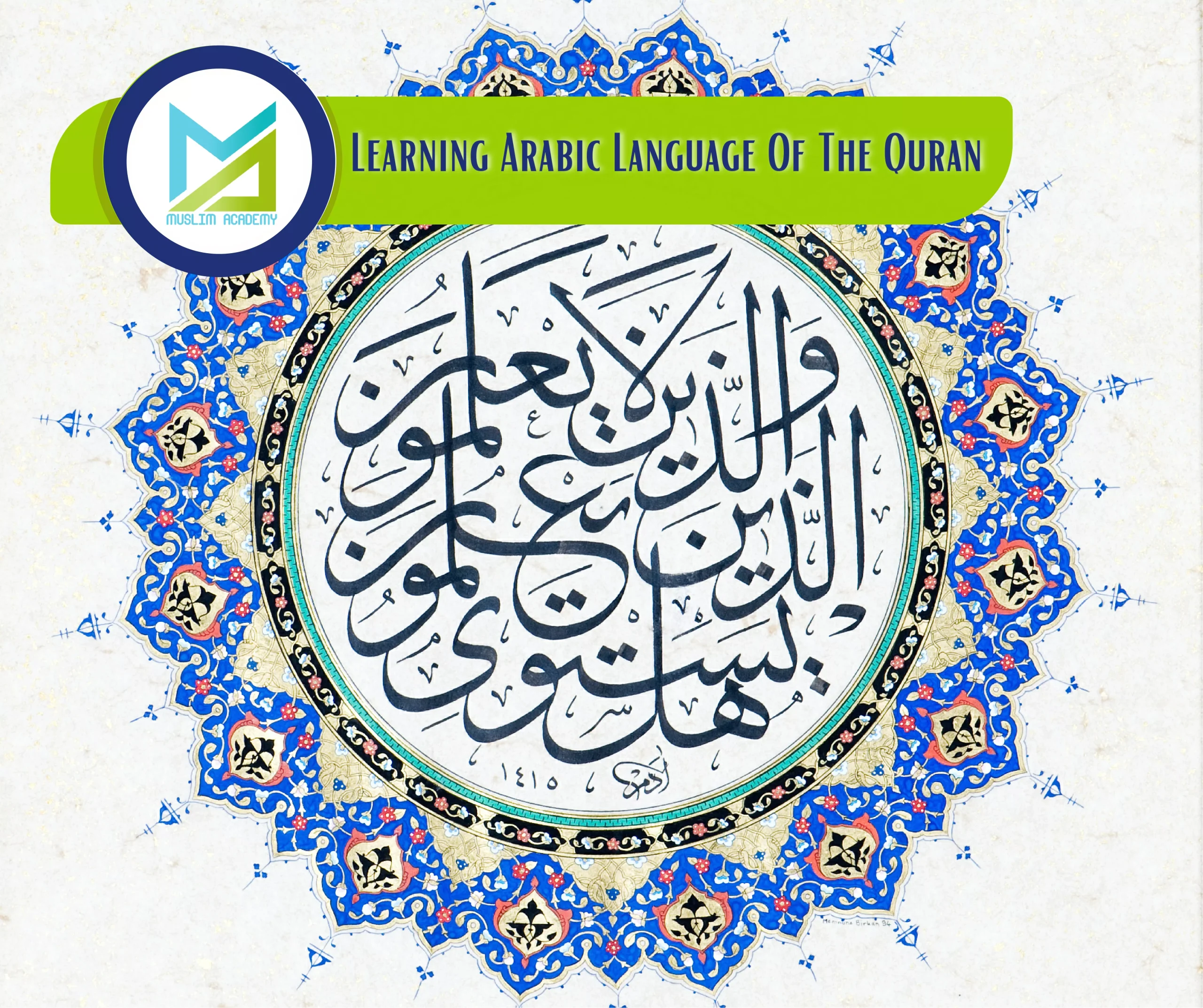Start Online Quran Classes with Muslim Academy
https://muslimacademy.net/index.php/free-trial/
Learning the Arabic Language Of The Quran with Muslim Academy represents one of the most profound and rewarding journeys a Muslim can embark upon. This sacred language serves as the direct medium through which Allah communicated His final revelation to humanity. For millions of Muslims worldwide, understanding Classical Arabic opens doors to deeper spiritual connection, enhanced comprehension of Islamic teachings, and a more meaningful relationship with their faith.
The Arabic language of the Quran differs significantly from modern conversational Arabic. Known as Classical Arabic or Fusha, this form of the language maintains the eloquence, precision, and beauty that has remained unchanged since the revelation of the Quran over fourteen centuries ago. This linguistic preservation ensures that every Muslim who undertakes the journey of Learning Arabic Language Of The Quran with Muslim Academy can access the same divine message in its original, unaltered form.
The Significance of Quranic Arabic
Understanding why Learning Arabic Language Of The Quran with Muslim Academy holds such importance requires recognizing the unique relationship between language and meaning in Islamic theology. The Quran was revealed in Arabic, not merely as a coincidence of geography or culture, but as a deliberate choice that reflects the language’s capacity for precision, beauty, and depth of expression.
Arabic possesses linguistic features that make it particularly suited for conveying complex theological concepts. The root system of Arabic allows for intricate relationships between words, creating layers of meaning that often cannot be fully captured in translation. When believers engage in Learning Arabic Language Of The Quran with Muslim Academy, they gain access to these subtle nuances, wordplay, and linguistic miracles that demonstrate the text’s divine origin.
The emotional and spiritual impact of understanding the Quran in its original language cannot be overstated. Many Muslims describe profound moments of connection and enlightenment when they first comprehend verses directly in Arabic, without the intermediary of translation. This direct access to divine speech creates an intimacy with the text that transforms both personal prayer and broader spiritual practice.
Historical Context and Linguistic Heritage
The Arabic of the Quran represents the pinnacle of Classical Arabic literature. During the pre-Islamic period, Arabic poetry and oratory had reached remarkable heights of sophistication. When the Quran was revealed, it not only matched this linguistic excellence but surpassed it, challenging the finest poets and speakers of the time with its unmatched eloquence and beauty.
This historical context makes Learning Arabic Language Of The Quran with Muslim Academy particularly fascinating from a linguistic perspective. Students are not merely learning a religious text but engaging with a masterpiece of world literature that has influenced countless generations of scholars, poets, and thinkers across diverse cultures and civilizations.
The preservation of Quranic Arabic has also played a crucial role in maintaining the stability of the Arabic language itself. Unlike many ancient languages that have evolved beyond recognition, Classical Arabic remains accessible and comprehensible today because of its continuous use in religious contexts and scholarly discourse throughout the Islamic world.

Fundamental Principles of Quranic Arabic
When beginning the process of Learning Arabic Language Of The Quran with Muslim Academy, students must understand several fundamental principles that distinguish this form of Arabic from other varieties. Classical Arabic follows strict grammatical rules that govern word formation, sentence structure, and meaning derivation. These rules, codified by early Islamic grammarians, provide the framework for accurate comprehension and interpretation.
The concept of i’rab (grammatical inflection) plays a central role in Quranic Arabic. The endings of words change based on their grammatical function within sentences, affecting meaning and interpretation. Mastering i’rab is essential for accurate understanding, as slight changes in word endings can significantly alter the meaning of verses.
Root-pattern morphology represents another crucial aspect of Quranic Arabic. Most Arabic words derive from three-letter roots that carry core meanings. These roots combine with various patterns to create families of related words. Understanding this system enables students to recognize connections between seemingly different words and grasp deeper meanings within the text.
Effective Learning Strategies and Methodologies
Successful Learning Arabic Language Of The Quran with Muslim Academy requires a multifaceted approach that combines traditional methods with modern pedagogical techniques. The classical method of studying with qualified scholars remains invaluable, as these teachers can provide insights into grammatical subtleties, historical context, and interpretive traditions that enhance comprehension.
Memorization plays a significant role in traditional Arabic learning. Many successful students begin by memorizing short chapters of the Quran, which provides them with a foundation of vocabulary and grammatical patterns. This memorized material then serves as a reference point for understanding grammatical concepts and linguistic structures.
Modern language learning techniques can complement traditional approaches effectively. Spaced repetition systems help students retain vocabulary and grammatical rules. Audio resources allow learners to develop proper pronunciation and rhythm. Interactive exercises and applications can make grammar practice more engaging and systematic.
The integration of translation studies proves particularly valuable when Learning the Arabic Language Of The Quran with Muslim Academy. By comparing Arabic texts with high-quality translations, students can observe how translators handle linguistic challenges and recognize areas where the original Arabic contains meanings that cannot be fully rendered in other languages.
Grammar and Syntax Essentials
Arabic grammar presents unique challenges and opportunities for students engaged in Learning Arabic Language Of The Quran with Muslim Academy. The verb-subject-object word order differs from many other languages, and Arabic allows for considerable flexibility in sentence structure for stylistic and rhetorical purposes.
Understanding Arabic verbs requires mastering a complex system of conjugations that indicate not only tense but also mood, voice, and the relationship between the action and its subject. The Quran employs this verbal system with remarkable precision, using specific forms to convey subtle theological and philosophical concepts.
Noun declension in Arabic follows patterns that indicate grammatical function through case endings. The nominative, accusative, and genitive cases each serve specific syntactic roles, and understanding these functions is crucial for accurate interpretation of Quranic verses.
Particles and connectors in Arabic carry significant meaning and cannot be overlooked in a serious study. Words that might seem insignificant to beginning students often carry important theological implications and contribute to the overall coherence and beauty of the text.

Vocabulary Development and Retention
Building a robust vocabulary represents a cornerstone of Learning Arabic Language Of The Quran with Muslim Academy. The Quran contains approximately 2,000 unique root words, but understanding the most common 500-800 roots provides access to the majority of the text. Strategic vocabulary acquisition focuses on high-frequency words that appear throughout the Quran.
Contextual learning proves more effective than rote memorization for long-term retention. Students who learn words within their Quranic contexts develop stronger associations and a better understanding of how words function within the sacred text. This approach also helps learners appreciate the literary and rhetorical techniques employed in the Quran.
Etymology and word relationships enhance vocabulary acquisition significantly. Understanding how words derive from common roots and relate to one another creates networks of meaning that facilitate both retention and comprehension. This knowledge also helps students recognize cognates and make educated guesses about unfamiliar terms.
Cultural and Contextual Understanding
Learning the Arabic Language Of The Quran with Muslim Academy extends beyond linguistic competence to include cultural and historical awareness. The Quran emerged within a specific cultural context, and understanding the social, political, and religious environment of seventh-century Arabia enhances comprehension of many verses and concepts.
Knowledge of pre-Islamic Arabic poetry and literary traditions provides a valuable background for appreciating the Quran’s linguistic innovations and rhetorical techniques. Many Quranic passages employ literary devices and stylistic features that would have been immediately recognizable to the original audience but may require explanation for contemporary students.
Understanding the historical circumstances surrounding the revelation of specific verses (known as asbab al-nuzul) can illuminate meanings that might otherwise remain obscure. This contextual knowledge helps students appreciate why particular words were chosen and how specific linguistic features contribute to the overall message.
Technology and Modern Learning Resources
Contemporary students engaged in Learning the Arabic Language Of The Quran with Muslim Academy benefit from unprecedented access to digital resources and technological tools. Online dictionaries provide instant access to root meanings, grammatical information, and usage examples. Mobile applications offer convenient vocabulary practice and grammar exercises that can be completed during brief periods throughout the day.
Digital Quranic texts with morphological analysis break down each word into its parts, showing root letters, patterns, and grammatical functions. These tools serve as excellent learning aids, particularly for students who may not have access to traditional teachers or classroom instruction.
Video lectures and online courses provide structured learning opportunities with expert instruction. Many renowned scholars now offer courses through digital platforms, making high-quality Arabic instruction accessible to students worldwide regardless of their geographic location.
Interactive software and games can make grammar practice more engaging and effective. These tools often employ spaced repetition algorithms and adaptive learning techniques that personalize instruction based on individual progress and needs.
Overcoming Common Challenges
Students pursuing Learning Arabic Language Of The Quran with Muslim Academy face several predictable challenges that can be addressed through proper preparation and realistic expectations. The complexity of Arabic grammar often overwhelms beginning students, but systematic study and patient practice gradually build competence and confidence.
Pronunciation difficulties arise frequently, particularly for students whose native languages lack certain Arabic sounds. Regular listening practice combined with recording and self-evaluation helps develop accurate pronunciation. Working with native speakers or qualified teachers provides invaluable feedback and correction.
Motivation can wane during difficult periods when progress seems slow. Setting realistic goals, celebrating small achievements, and maintaining focus on the spiritual significance of the undertaking help sustain enthusiasm through challenging phases of learning.
Building Long-term Success and Mastery
Achieving proficiency in Learning Arabic Language Of The Quran with Muslim Academy requires long-term commitment and realistic expectations about the learning process. Language acquisition occurs gradually through consistent exposure and practice over extended periods. Students who maintain regular study schedules and integrate Arabic learning into their daily routines achieve better results than those who study intensively but sporadically.
Regular reading practice with gradually increasing difficulty levels builds both competence and confidence. Beginning with simple verses and progressing to more complex passages allows students to develop their skills systematically while maintaining motivation through achievable challenges.
Joining study groups or finding learning partners provides accountability, motivation, and opportunities for discussion and mutual support. Learning alongside others creates a community of practice that enhances both the social and educational aspects of language acquisition.
The journey of Learning Arabic Language Of The Quran with Muslim Academy represents more than academic study; it constitutes a spiritual quest that deepens faith, enhances worship, and creates lasting connections with the divine word. Through patient study, consistent practice, and sincere intention, students can achieve the profound goal of understanding the Quran in its original, sacred language.
